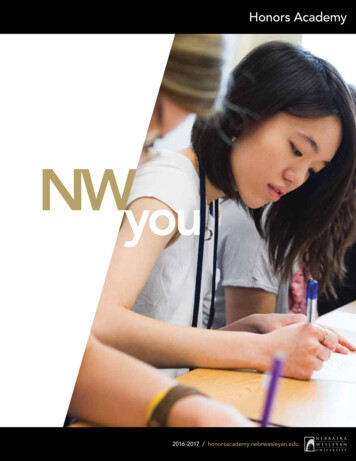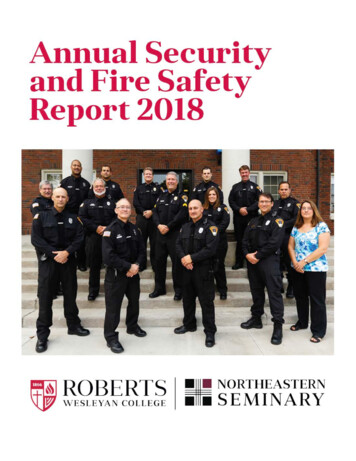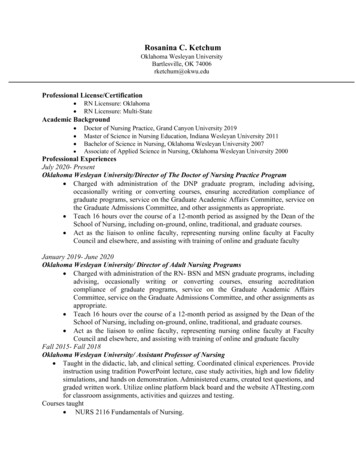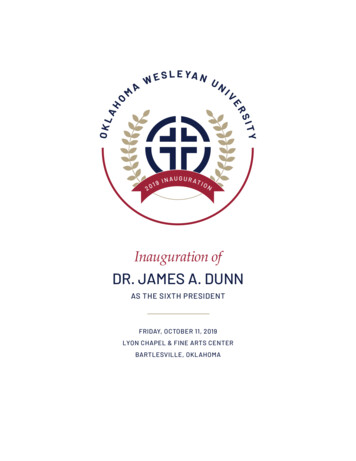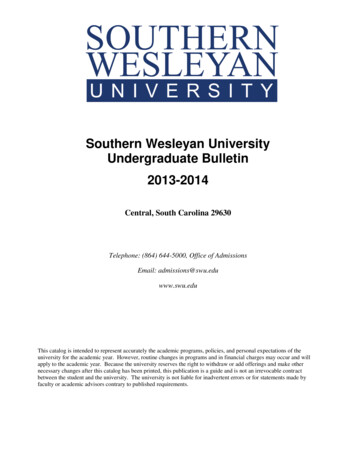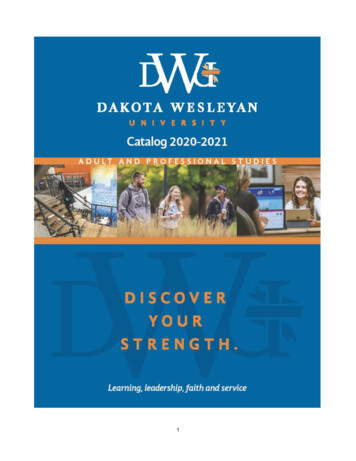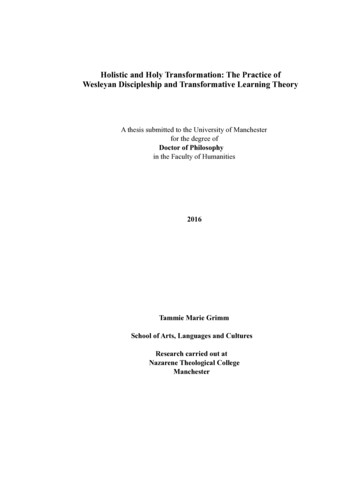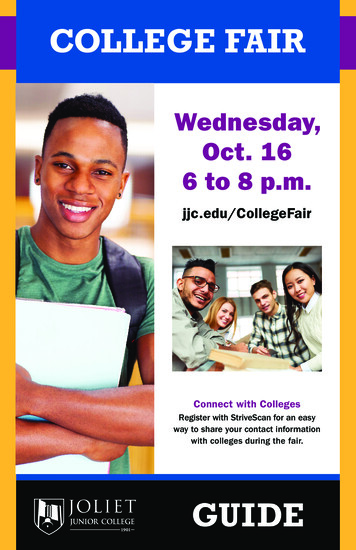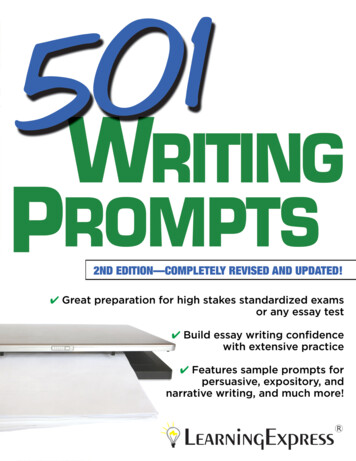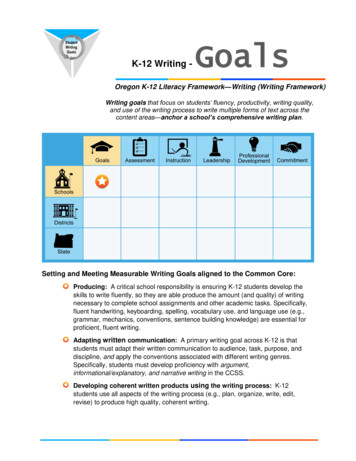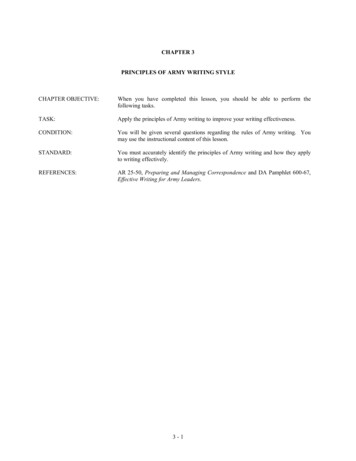
Transcription
Writing ProgramWRITING PROGRAMWesleyan offers students a vibrant writing community and a multitude of waysto pursue their interest in writing. Writers, editors, and publishers visit campusthroughout the year, and students support more than 20 magazines, journals,and literary groups. The curriculum emphasizes academic writing in many subjectareas and also offers courses in fiction writing, creative nonfiction, poetry,screenwriting, playwriting, and mixed forms. The establishment of the ShapiroCreative Writing Center at 167 High Street signals the importance the Universityattaches to writing. The Shapiro Center serves as a hub for writing activitiesand provides a venue for readings, workshops, colloquia, informal discussions,student-generated events, and receptions. Its lounge is open to all studentsenrolled in creative-writing courses. The Shapiro Center also houses writingfaculty, including fiction writer Amy Bloom, the Distinguished University Writerin-Residence.The creative writing concentration in the English major. This concentrationallows students to pursue creative writing at a high level in the context ofadvanced literary study. The concentration fosters the study of the historyand practice of individual genres and of new hybrid forms and offers studentsthe opportunity to work closely with the University’s full-time writing faculty:the Shapiro-Silverberg Professor of Creative Writing, the internationallyrenowned poet Elizabeth Willis; Lisa Cohen, a writer of creative nonfiction,fiction, and poetry; and editor Anne Greene. Recent visiting faculty includessuch distinguished writers as Hilton Als, Andre Aciman, Paul La Farge, Douglas A.Martin, and Clifford Chase. Enrollment in creative-writing courses in the EnglishDepartment is not limited to English majors.Creative writing in the College of Letters. Creative writing has long been animportant component of the College of Letters curriculum, with an entry-leveland an advanced course offered every year and open to students in all majors.COL majors are encouraged to write creative honors theses.The Writing Certificate. The University’s Writing Certificate /), essentially a minor, is opento students working in any major who wish to make writing an area ofconcentration. Courses that may count toward the certificate are drawn frommany departments. They range from fiction writing, poetry, and creativenonfiction to journalism, biography, arts and film criticism, translation, andwriting about science. In addition to fulfilling the coursework requirements forthe certificate, students create a portfolio of their work and present their writingin public. The certificate sponsors a number of courses that carry the WRCTdesignation.The Writer’s Block. This small residential community provides an opportunity forfirst-year students and upper-class students with a particular interest in writingto live together and collaborate on formal and informal programs.FACULTYRachael BarlowMA, Indiana University Bloomington; PHD, Indiana University BloomingtonAdjunct Assistant Professor of Academic Writing; Associate Director forAssessmentAmy B. BloomBA, Wesleyan University; MSW, Smith CollegeShapiro-Silverberg Professor of Creative Writing; Professor of the Practice inCreative Writing; Professor of the Practice, English1Elizabeth (Beth) Ann HepfordBA, University Of Kansas; MA, Arizona State University; PHD, Temple UniversityAssistant Professor of the Practice in TESOL; Assistant Professor of the Practice,Education Studies; Assistant Professor of the Practice, EnglishDouglas Arthur MartinBA, University of Georgia Athens; MFA, The New School; PHD, CUNY TheGraduate CenterAssistant Professor of the Practice in Creative Writing; Assistant Director,Creative Writing; Assistant Professor of the Practice, EnglishSarah RyanBA, Capital University; JD, Quinnipiac University; MLS, Texas Womans University;PHD, Ohio UniversityAssociate Professor of the Practice in Oral CommunicationLauren SilberBA, University of Connecticut; MA, University of Massachusetts Amherst; PHD,University of Massachusetts AmherstAssistant Professor of the Practice in Academic Writing; Assistant Professor ofthe Practice, Feminist, Gender, and Sexuality Studies; Assistant Professor of thePractice, American Studies; Assistant Professor of the Practice, EnglishVISITING FACULTYSteve AlmondBA, Wesleyan University; MFA, University of North Carolina at Chapel HillKim-Frank Visiting WriterAmity GaigeBA, Brown University; MFA, University of IowaVisiting Scholar in the Shapiro Center for Writing at Wesleyan UniversityAriel Victoria LevyBA, Wesleyan UniversityVisiting Scholar in the Shapiro Center for Writing at Wesleyan UniversityGregory PardloVisiting Scholar in the Shapiro Center for Writing at Wesleyan UniversityHannah RyanBA, Point Loma Nazrene CVisiting Instructor of WritingSaid SayrafiezadehVisiting Scholar in the Shapiro Center for Writing at Wesleyan UniversitySalvatore ScibonaBA, St. John's College; MFA, University of IowaVisiting Scholar in the Shapiro Center for Writing at Wesleyan UniversityBrando SkyhorseBA, Stanford University; MFA, University of California, IrvineVisiting Scholar in the Shapiro Center for Writing at Wesleyan University; VisitingAssistant Professor in Liberal StudiesWRCT110F Academic Writing in the US for International Students (FYS)This course explores United States culture and history through the art ofwriting essays. Students will analyze renowned works by US authors whileconcurrently writing their own essays and focusing on essay structure, analyticalwriting, cohesiveness, conciseness, and the mechanics of grammar. The courseis designed to prepare international students for the expectations their USprofessors will have for their academic writing. Assignments will involve readingand writing a variety of essays, pre-writing activities, journal entries, academic
2Writing Programvocabulary exercises, and advanced grammar analysis. As models for their ownwork, students will study exemplary essays from a variety of essay genres byauthors such as Martin Luther King Jr., Thomas Jefferson, Abraham Lincoln, andReginald Rose. The workshop-style format of the class will encourage academicexchanges, critical analysis, and peer editing. The course is recommended forinternational students, students who immigrated to the US after middle school,and students whose dominant language is not English.Offering: HostGrading: OPTCredits: 1.00Gen Ed Area: HA-ENGLPrereq: NoneWRCT111F Writing About Culture (FYS)In the age of social media, pithy critiques and quick reads circulate quickly.Whether on Twitter, Facebook, Instagram, or Reddit, the Internet providesa space for everyone to share their opinions on popular culture and currentevents. This course asks us to slow down and rewind a bit to consider whatscholars in cultural studies might teach us when it comes to writing aboutculture. We will ask the following: What is culture? What can culture teach usabout the powerful structures and ideologies that shape our worlds? How mightthis understanding of culture help us fashion our selves and imagine new realitiesand ways of being?To address these questions, students will read theory alongside contemporarycultural criticism both for content and for style and method of analysis. Inaddition to reading and discussion, students will practice writing about culturethrough multiple lenses, discovering and developing their own writerly valuesin order to produce a publishable piece of cultural criticism to be submitted to apublication of their choice by the end of the semester.Offering: HostGrading: OPTCredits: 1.00Gen Ed Area: HA-WRCTPrereq: NoneWRCT112F The Logistics of Climate Change (FYS)According to the World Bank, an increase in global temperatures of morethan 2 C by the year 2100 will likely submerge coastal cities from New Yorkto Shanghai beneath rising seas. Yet as many theorists note, the global supplychains the World Bank helps facilitate also fuel global warming. How do wemake sense of economic institutions warning us of disasters their actions mayhasten? Why is there so much disagreement among scholars concerning thequickening pace of climate change alongside the emergence of supposedlypostindustrial economies in the developed world? And what can we do aboutthat pace today? This class surveys two sweeping transformations of social life inrecent decades to pose such questions. Climate change, we will wager, can't beunderstood apart from the logistics revolution that made globalization possible:The massive freeway systems, ports, algorithms, microprocessors, and containerships transporting goods and money from one corner of the globe to another.Along the way we will pay particular attention to the uneven racial and genderdynamics governing who lives where, who acquires what they need to survive,and how they survive in a world arranged by the logistics revolution drivingclimate change today.Offering: HostGrading: OPTCredits: 1.00Gen Ed Area: HA-WRCTPrereq: NoneWRCT113 A Nation of Immigrants?America is a nation of immigrants. This ideological epithet has come to definethe American experience as one of opportunity, advancement, and nationalincorporation. This course will approach this narrative from the perspective ofim/migrants, refugees, exiles, displaced persons, and colonized minorities. To doso, we will read sociology, history, and political theory alongside literary texts,inquiring into discourses of migration, mobility, and (un)belonging through aninterdisciplinary and intersectional lens.Offering: HostGrading: OPTCredits: 1.00Gen Ed Area: HA-WRCTIdentical With: ENGL113Prereq: NoneWRCT113F A Nation of Immigrants? (FYS)America is a nation of immigrants. This ideological epithet has come to definethe American experience as one of opportunity, advancement, and nationalincorporation. This course will approach this narrative from the perspective ofim/migrants, refugees, exiles, displaced persons, and colonized minorities. To doso, we will read sociology, history, and political theory alongside literary texts,inquiring into discourses of migration, mobility, and (un)belonging through aninterdisciplinary and intersectional lens.Offering: HostGrading: OPTCredits: 1.00Gen Ed Area: HA-WRCTIdentical With: ENGL113FPrereq: NoneWRCT114F Why You Can't Write (FYS)Institutions of higher education have required first-year students to takewriting courses for well over a century. In doing so, they have made it clearthat educational and professional success are deeply tied to writing skills.But why is this? This class asks what it means to teach students how towrite by probing seemingly stable concepts and practices like language andcommunication. We will discuss the history of writing studies in higher educationbefore taking up debates over literacy, language standardization, educationas imperialism and colonialism, theories of writing instruction, assignmentdesign, and assessment practices. In addition to introducing students to thefield of composition, rhetoric, and writing studies, so, too, will this coursecenter the practice of writing. As such, students can expect to write, revise, andcomment on classmates' writing regularly. Assignments will include a personalliteracy narrative, response papers, weekly journals, and creative projects likeassignment and rubric design.Offering: HostGrading: OPTCredits: 1.00Gen Ed Area: HA-WRCTIdentical With: EDST114FPrereq: NoneWRCT115 Writing MentoringHave you ever wanted a personal writing collaborator? Someone who wouldmeet with you privately to help you with your writing?Your Writing Mentor will work with you on your particular writing concerns,whether you need help generating ideas, structuring your essay, improvingsentence clarity and grammar, or managing your time. As mentors and menteesmeet on a weekly basis, this program is designed for students who enjoy regularcollaboration. If you participate, you will enroll in a .25 credit tutorial and have apeer assigned to meet with you throughout the semester.We work with students of all writing abilities and in all disciplines. All services arefree.To apply for a writing mentor, contact the Ford Fellow atwritingworks@wesleyan.edu.
Writing ProgramOffering: HostGrading: Cr/UCredits: 0.25Gen Ed Area: HA-WRCTPrereq: NoneWRCT115F Diffusion of Innovation (FYS)Most inventions never make it out of the laboratory. Few reach the public.Why? Innovations and great ideas are not self-evident. Rather, inventors mustpersuade their fellow citizens that their ideas have merit and are worth adopting.This course will survey the broad field of "Diffusion of Innovations." Throughcase studies from around the globe and discussions of diffusion theory, studentswill learn how innovations ranging from vaccines to the world's largest particleaccelerator gained acceptance through analog and digital communication.Students will also learn about diffusion failures ranging from water boiling to theDVORAK keyboard. They will then design a strategy for disseminating an existingbut underappreciated scientific or technological innovation to United Statesadopters. The strategy will demonstrate a keen appreciation of scientific merit,diffusion of innovation theory, and the nuances of U.S. culture. This first yearseminar course will also familiarize students with the methods used to collect,interpret, analyze, and present evidence in the social sciences, particularly in thefield of communication.Offering: HostGrading: OPTCredits: 1.00Gen Ed Area: SBS-ALLBIdentical With: CSPL115FPrereq: NoneWRCT116F The Literature of Travel (FYS)Travel literature has been one of the most fundamental subgenres of writingsince humans first began to explore and record their thoughts. Much of what wasfirst known about the world as we know it comes down to us from traveloguesof early explorers, and this rich subgenre explores issues of identity and race,knowledge and power, while also often being alternately infused with longing forhome or longing for difference. The literature of travel, exploration, and foreignmilieus actually falls under various categories including journalism, nonfictionwriting, and fiction. Any study of travel literature prompts us to ponder thetheoretical problem of understanding people and places that are alien to us. Thisseminar will expose students to a wide variety of 'travel literature,' includingnovels, essays, travelogues, and documentaries. Throughout this course, wewill compare received, conventional notions of particular places with what wediscover through our readings. Come prepared to read and write intensively.Offering: HostGrading: OPTCredits: 1.00Gen Ed Area: HA-WRCTPrereq: NoneWRCT117F Instances of Collective Memory (FYS)Both history and fiction tell stories. They evaluate facts, construct contexts,and foreground patterns and associations--all using language as their primarytool. In this course, we will analyze key moments in the formation of collectiveand cultural memories in 20th-century history, philosophy, and literature. Wewill think about how individual memory and collective remembrance connect,how larger stories are built up from archives and personal stories, and howthese narratives are shaped by changes in the world around them. We'll payspecial attention to how the World Wars and the Cold War are memorializedand to the importance of these narratives to contemporary Jewish identity andremembrance in Germany, Israel, and the United States.Offering: HostGrading: OPTCredits: 1.00Gen Ed Area: HA-WRCT3Identical With: CJST234F, GRST234FPrereq: NoneWRCT120F Uncertainty and the Future (FYS)The world we live in is full of risk and uncertainty. Science, politics, andeconomics all tell us that this is a hazardous era in which great changes areinevitable and catastrophes are possible. How do people manage living in suchan uncertain world? This first-year seminar introduces students to researchand writing in the social sciences by studying a driving factor in the humansearch for knowledge: the uncertainty of the unknown future. We will considerhow the ways in which humans define, relate to, and experience uncertaintyinfluence social well-being and the production of the future. We begin withthe anthropological study of uncertainty, which is rooted in the study of ritualand magic, and then consider perspectives in psychology, economics, andecology. While we will reflect on the "negative" side of uncertainty, such asrisk, precariousness, and insecurity, we will also examine the way the creativemanagement of uncertainty is sometimes romanticized and consider theopportunities for creativity, adaptation, resilience, and imagination in uncertaintimes.Offering: HostGrading: OPTCredits: 1.00Gen Ed Area: HA-ENGLIdentical With: SISP120FPrereq: NoneWRCT121F Are You a Feminist? (FYS)Taking our cue from Beyoncé and the debates her music has produced, thisFirst Year Seminar investigates the meaning of feminism by considering howwriters, artists, activists, academics, and public intellectuals discuss the topic.Students' curiosity about feminism - as topic, politics, identity, and practice will guide class meetings where we will discuss readings by prominent feministwriters, scholars, and critics. Students will leave the course with a clear sense ofthemselves as writers and thinkers, as well as an understanding of the ways inwhich gender and sexuality intersect with race, class, and other social identitiesand of the multiplicities of feminisms in our contemporary moment.Offering: HostGrading: OPTCredits: 1.00Gen Ed Area: HA-ENGLPrereq: NoneWRCT130F Living within the Bio-Logical (FYS)How do biology and society relate to each other? This first-year seminar providesan introductory overview of how the biosciences have been entangled in socialcontexts, from the Enlightenment to the current technoscience era. We willexamine contemporary case studies where society impacts biology and biologyimpacts society, particularly those that show the complex interplay betweenthe body and the environment. We will look at how rates of obesity relateto inequality and insecurity, consider the impact of toxins on the body andenvironment, and discuss emergent research that challenges longstandingbeliefs about medical science. This anthropologically informed course providesethnographic accounts that give crosscultural context to the questions posed.Throughout the course, students will learn to discuss the interrelation of thebiological with the social, political, and economic, and we will critically reflect onthe influence of politics and economics on human biological agency.Offering: HostGrading: A-FCredits: 1.00Gen Ed Area: HA-WRCTIdentical With: SISP121FPrereq: None
4Writing ProgramWRCT133F Race and Representation (FYS)This first-year seminar will introduce students to theories and understandingsof race, racism, and racial inequality as debated in the academy and the public(US) sphere. So, too, will the course consider race as it is lived and representedin cultural objects such as film, literature, law, television, and music. Readingand writing will be heavily emphasized. Through regular writing activities,students will find comfort with and a voice for discussing a range of culturaltexts, preparing them for everyday discussions about race in US culture.Offering: HostGrading: OPTCredits: 1.00Gen Ed Area: HA-WRCTPrereq: NoneWRCT135 Writing about Research: U.S. StyleThis course is designed to prepare non-native speakers of English to write aboutresearch in U.S. academia. Students will focus on the structure, cohesive devices,citation styles, and academic vocabulary commonly used in literature reviews,theoretical papers, and primary research studies. As a topic of common interest,example readings will focus on language research including statistical analyses oflanguage learners; anthropology studies of how gender, race, and socioeconomicgroup affect language; and overviews of theories about language acquisition.Throughout the course, students will learn organizational skills for longer papers,summarize numerical and theoretical data, and practice the mechanics ofwriting.Offering: HostGrading: OPTCredits: 1.00Gen Ed Area: HA-WRCTIdentical With: ENGL135Prereq: NoneWRCT135F How Language Works: The Beliefs and Bias that Affect our SocialWorld (FYS)This first-year seminar takes an in-depth look at how we communicate. What dowe believe about language? How does that affect our interactions on personaland societal levels? Drawing on readings from the fields of linguistics andanthropology, we will challenge common language myths and beliefs relatedto multilingualism, language and dialectal stereotypes, gendered language, andlanguage learning. To synthesize those ideas, students will write reflectively anddiscuss their own oral and written language, conduct short research projects, andsynthesize their ideas into a final paper related to a topic in the course.Offering: HostGrading: OPTCredits: 1.00Gen Ed Area: HA-WRCTIdentical With: CGST213FPrereq: NoneWRCT140L Teaching English to Speakers of Other LanguagesThis course explores theories and teaching methods related to learning English asa second language (ESL). Students will critically examine current and past "bestpractices" for teaching English to speakers of other languages (TESOL) and theseminal theories they are based on. In addition, we will discuss the various needsof English language learners, including both children and adults, and studentscoming from a variety of social and cultural backgrounds. Students will be askedto apply what they've learned by creating their own lesson plans and activities,critiquing ESL textbooks, and giving teaching demonstrations. If you choose towork with a student (or tutor in an organization), you may be able to use thisclass to fulfill a Category 5 requirement in Education Studies.Offering: HostGrading: OPTCredits: 1.00Gen Ed Area: HA-WRCTIdentical With: EDST140L, ENGL143LPrereq: NoneWRCT150 The Science Behind Popular Scientific LiteratureThe Science Behind Popular Scientific Literature. This course focuses on academicSTEM writing and is an exploration of the scientific literature in the referencelist of Elizabeth Kolbert's "The Sixth Extinction." Assignments will consist ofnumerous low-stakes writing prompts with extensive peer and instructorfeedback, and a term project paper constructed along the lines of a STEM reviewpaper. This course fulfills a key need in developing science literacy and teachingstudents how to find and use reliable sources to critically evaluate popularscience writing.Offering: CrosslistingGrading: A-FCredits: 1.00Gen Ed Area: NSM-CISIdentical With: CIS150Prereq: NoneWRCT150F The Science Behind Popular Scientific Literature (FYS)The Science Behind Popular Scientific Literature. This course focuses on how topresent material to a scientific audience and is an exploration of the scientificliterature in the reference lists of Rachel Carson's "Silent Spring." Assignmentswill consist of numerous low-stakes writing assignments with extensive peer andinstructor feedback, and a term project paper constructed along the lines of aSTEM review paper. This course fulfills a key need in developing science literacyand teaching students how to find and use reliable sources to critically evaluatepopular science writing.Offering: CrosslistingGrading: OPTCredits: 1.00Gen Ed Area: NSM-CISIdentical With: CIS150FPrereq: NoneWRCT200 Integrative Learning Project 1: Reflecting About the Liberal ArtsThe Integrative Learning Project is a .50 credit course that allows students tolearn to describe in a coherent and engaging narrative the various academic andnon-academic activities, projects, and experiences that have been importantfor them while in college and to practice doing so for a variety of audiences(e.g. employers, graduate schools, etc.). Participants should be students whoare interested in crafting a narrative about their personal and intellectualdevelopment, and who want to be able to talk about what skills they havecultivated during their time at Wesleyan and what they still want to learn.All sophomores, juniors and seniors are welcome in this course. This courserequires a willingness to discuss one's strengths, achievements, weaknesses,and failures. Students will not only engage in reflection about their skills andexperiences, but will also have the opportunity to design an online portfolio inWordPress, the world's most popular content management software, and testthe portfolio with different audiences by employing user experience design (UX)principles and research methodologies. Students can take this course more thanonce, but only once per academic year.Offering: HostGrading: Cr/UCredits: 0.50Gen Ed Area: NoneIdentical With: RL&L250, AFAM250, CSPL200Prereq: NoneWRCT201 Learning to WriteWriting is central to education in the U.S., but how does someone learn towrite? In this course, students will consider this question by reading theories ofcomposition, debating key concepts of writing such as reflection, transfer, andtranslanguaging, as well as discussing scholarship out of cultural studies, literacy
Writing Program5studies, genre studies, technical and professional writing, and public writing.Together we will explore the potential of writing education, carefully consideringhow we, as educators, can foster just and innovative writing education. Aswe read about writing instruction, literacy, and assessment, students will beexpected to bring scholarship in dialogue with lived experience. To do so, theywill engage in a number of praxis-based assignments, including group work todevelop assignments, assessment practices, and curricular recommendations.The course will culminate in a final project of each students' design, that tacklesthe practicalities of teaching writing.Offering: HostGrading: OPTCredits: 1.00Gen Ed Area: HA-WRCTPrereq: Noneregarding both affect ESL programs in K-12 education, bilingual businesses,immigration policies, and the U.S. legal system. We will also discuss therecommendations of scholars for increasing multilingualism in business andeducation, improving education for English-language learners, and effortsto improve non-native English speakers' ability to navigate the legal system.The course is recommended for non-native speakers of English and anyoneconsidering working with English-language learners such as teachers, tutors, NGOpersonnel, and legal or business professionals.Offering: HostGrading: OPTCredits: 1.00Gen Ed Area: HA-WRCTIdentical With: AMST227, EDST205Prereq: NoneWRCT202 Pedagogy for Teaching English to Speakers of Other Languages TutorsThis course offers an introduction to pedagogical techniques and theoriesfor teaching English to Speakers of Other Languages (TESOL). The class isideal for students considering a career in K-12 education, as the number ofstudents whose first language is not English is rising in the U.S. every year.Students enrolled in this course will gain practical experience by committingto volunteering at Middletown public schools while taking this course andare encouraged to continue their service afterward. There is a volunteeringcommitment of 2 hours/week minimum during the semester.Offering: HostGrading: Cr/UCredits: 0.50Gen Ed Area: HA-WRCTIdentical With: EDST202Prereq: NoneWRCT211 Calderwood Seminar in Public Writing: Legal Advocacy for DisabledVeteransThe public rarely understands what it takes to fight for one's legal rights orbenefits. Good writers can translate those battles in ways that teach, empower,and (re)build community support for struggling individuals. This course is a studyin the translation of legal challenges into civic advocacy.WRCT204 Extreme Landscapes of the AnthropoceneThe "Anthropocene," a term coined to categorize the current geological epoch,has become a way in which social scientists can critically and creatively engagewith the impact of humanity on the ecological well-being of the Earth. Theinterdisciplinary and uncertain nature of this subject matter provides space forexperimental writing styles, innovative approaches to storytelling, and criticaldiscussion and debate. This course is designed to explore and challenge the term"Anthropocene," questioning how narrative and drama are entangled in thedissemination of complex truths, for better or worse.In this course, we will consider texts, short films, and other mixed media thatinvestigate the everydayness of extreme landscapes, from "capitalist ruins"to the depleting seas. We will dive into the social, political, economic, andscientific power-scapes that influence narratives about the environment, fromlate liberal ideology to corporate influence on science and the news. Through thecourse materials and activities, we will question how to communicate complexinformation with a broad range of people, particularly surrounding issues ofclimate change, sustainability, and environmental justice. Each student will buildtheir own writing portfolio of short essays for specific audiences. The class willcollectively build and design a storytelling website where they can share theirwork. Students are encouraged to apply an ethics of care and the art of "nonjudgmental attention" to their critical engagement with the Anthropocene.Offering: CrosslistingGrading: OPTCredits: 1.00Gen Ed Area: SBS-SISPIdentical With: SISP204, ENVS204, ANTH204Prereq: NoneWRCT205 English Language Learners and US Language PolicyThis course explores how explicit and implicit language policies in institutionsof power affect businesses, schools, and the legal system. More specifically,the course investigates how language choices, translations, and the policiesIn this course, students will write about real plaintiffs and legal cases for publicaudiences. As part of their journey, students will delve into the military andmedical files of a disabled veteran applying for a discharge upgrade from
to live together and collaborate on formal and informal programs. FACULT Y Rachael Barlow MA, Indiana University Bloomington; PHD, Indiana University Bloomington Adjunct Assistant Professor of Academic Writing; Associate Director for Assessment Amy B. Bloom BA, Wesleyan University; MSW, Smith College
